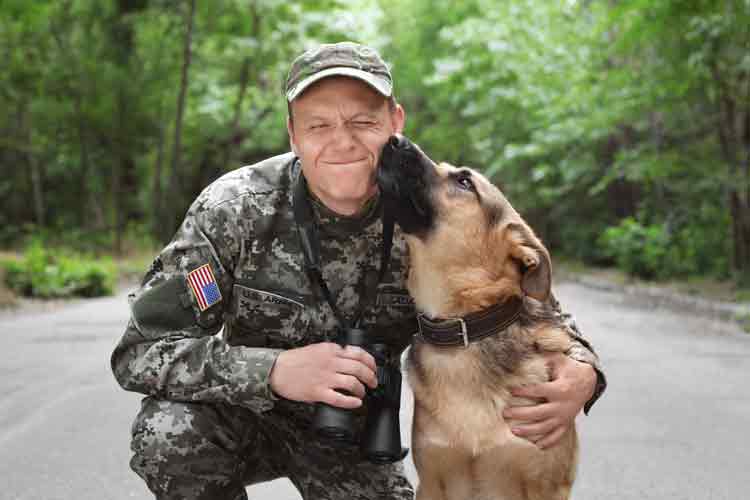Many veterans struggle with not only physical injuries from their service but mental disabilities as well. These can include PTSD, depression, anxiety, mood disorders, traumatic brain injury, eating disorders, and other mental illnesses. Currently, an estimated 1.5 million veterans are suffering from severe mental illness. Both emotional support animals (ESAs) and psychiatric service animals (PSD) can assist veterans suffering from these illnesses. Here are some of the common tasks psychiatric service dogs are performed to train for veterans.
Interrupting a PTSD Episode and Panic Attacks
One way both ESAs and PSDs can help someone with PTSD is by interrupting a flashback or panic attack. Psychiatric service dogs are trained to sense a person’s increasing anxiety levels and interject with physical contact. In a recent study conducted by Purdue University’s College of Veterinary Medicine, most veterans rated all of their service dog’s trained tasks to be moderately or quite a bit helpful in their daily lives.
Waking Individuals Up from Nightmares
Dogs can also be trained to wake their owners up from nightmares. For those suffering from anxiety or PTSD, being able to escape these nightmares and have a warm furry friend waiting for them when they wake up is extremely comforting.
Providing Security in Public Places
Service dogs can also be trained to look in the opposite direction of their owner to provide a sense of security. Veterans can rest easier knowing that their service dog is looking out for and protecting them in chaotic, crowded environments. They can also be trained to position themselves in front of the individual as a barricade if other people are getting too close for comfort.
Pressure Therapy
PSDs can also be taught to apply pressure therapy when an individual has a panic attack. The dog can climb on top of their owners and apply weight to specific pressure points, which helps relieve anxiety and panic attacks.
Both PSDs and ESAs can provide a massive service to veterans who are struggling with mental health problems. On average, service dog tasks were used by owners an average of 3.16 times a day, proving how valuable a psychiatric service dog can be. In some cases, the U.S Department of Veterans Affairs will cover the cost of service dogs for veterans. If you or someone you know could benefit from this, it is definitely worth looking into. Once you get a psychiatric service dog or emotional support animal, you will need a certification letter. You can quickly get one here at United Support Animal from one of our trained professionals.




